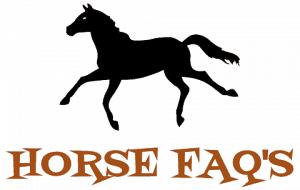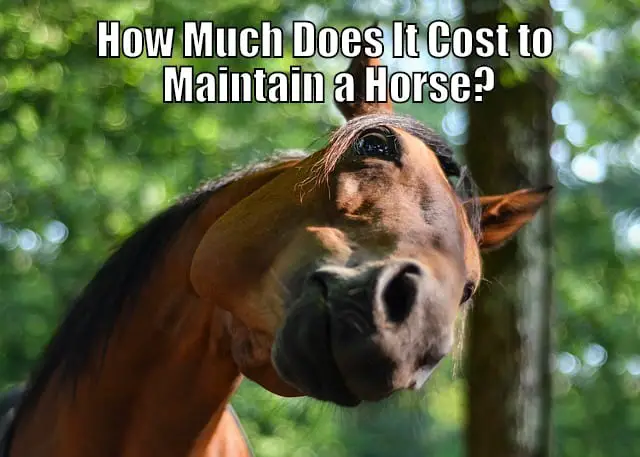I tell you, horse ownership will cost you a lot of bucks, and this is not a joke at all. You might see them eating grasses and hays but knowing how much those feeding costs is a little bit of an Earth-shaker, to be honest. So, if you are becoming a horsey-fanatic to the very extent that you are dreaming of having one or your kids are asking you to give them a pony to ride on as a birthday gift, I think you should think twice before getting one. Well, aside from their grassy feeding, horses need to have maintenance and should be given enough care and attention to live healthy just like humans. Having a pony is like having another kid in the house. Like you need to provide their needs just like how a baby or a child needs to be taken care of. As you go through this article, you will know what does it take to become a horse owner. Is it a nice hobby or is it just something that will put holes in the pickpockets?
So how much does it cost to maintain a horse? It is true that you can buy yourself or your kid a pony with a couple hundred dollars, but on the more realistic side of this, your horse’s maintenance will actually cost you more than ten times of your purchasing amount. According to a horse-ownership survey conducted by the University of Maine, it has been found out that the average amount of money that will surely be taken out of your wallets while taking care of your horse is roughly around $2,419 for median cost and $3,876 per annum in general. And talking about numbers here, you will be extracting like around $200-$325 per month for all of your horse’s daily needs. That amount of money is something that needs to be considered especially if you do not have an extra budget for this kind of hobby.
In owning horses, you must provide them all of their necessities so they will not be sickly and lame. For you to become a successful horse owner, you must provide them food, regular vet and farrier visits, stable or barn maintenance, boarding, and other additional expenses for grooming supplies, and of course your equipment as a rider that also houses some training expenses. What do you need to know about these factors, anyway?
All about your horses’ food
This is where a huge portion of your money goes. Since the amount of food that every horse needs vary according to their weight. The average expenses of an owner for a 1,100- pound horse is around $1,000 a year which means that about one-third of the total expenses per annum will be allocated to horse’s food. With this kind of fact, some owners tend to cut costs by choosing the cheapest food but also with good quality but not that comparable to the pricey ones.
As a breakdown of the expenses here is what I came up with considering the tight budget that you have for your horses:
- Some places sell bales for around $10. If you are to give your horse one-half of it, it will cost you around $3-$5 per day. Otherwise, if your horse needs to consume more than the half, try doing store canvassing and look for the cheapest bale in the locale
- Mineral supplement is also needed by horses. This costs around $30 or roughly $0.17 a day.
- Adding salt in feeding is being also done by owners to add taste to the food. A salt block costs around $14 or $0.04 a day.
- Some owners consider giving inexpensive concentrates that cost $1 a day
These vary depending on the number of your horses to feed and the weight of each them. However, if you have enough money for their food, it is always better to choose the kind of higher quality. An owner will always choose what is best for their horses.
Veterinarian and Farrier Visits
Just like any other animal or any pet that you could ever have, horses need regular maintenance and care. Since horses are a bit larger animals, they cost a lot more than the smaller ones. An average fee for a vet is around $485 per year which already includes check-ups, vaccinations and tests, deworming and other minor care needed by your horses. However, if your horse needs some serious medical attention, except that this stated average expenses will increase. So, it is always better to take care of our horses and to make sure that they will not get any disease. Being healthy is also a form of money saving.
Farrier visits are also being done regularly especially if your horses are shod. Their hooves must also be taken care of because if not given attention, poor hooves could lead to some problems like having an infection, joint hyper-extension, and even lameness. Considering the six to eight-week gap of farrier visits, the average cost of this per year is about $350-$500 which includes the trimming, re-shoeing, and re-reshaping.
General maintenance and boarding
Maintaining cleanliness inside your horse’s stable is what also being considered in a horse ownership budget. Providing them a good place to sleep and rest on is something that is needed by horses. Adding up fences around your horse’s area and providing them nice bedding, keeping their shelter in order, cost around $800 a year. This depends on the kind of area you wish your horses to have. Also, if you don’t have your place or spot for your horses, some owners rent other’s land property for their horse’s with food, water, and bedding. This might cost around $100-$600 depending on the kind of boarding that you want to have for your horses.
Other Expenses
Horses also need to have their grooming supplies most especially if you let your kids ride on your horse or even you, yourself. You may want your horses to have saddles, halters, brushes, shampoo, blankets and lead lines.
Also, as an owner, I am sure that you will also want to be a rider. Hence, you will need to buy some training materials and protective gears such as helmets, riding boots, chaps, crops, and gloves. These materials will surely add something on your budget list.
Related Questions:
What other factors might contribute to an increase in your budget for your horses?
- If you choose the more expensive concentrates and supplements.
- If you have unexpected vet and farrier bills.
- If you have a competing horse.
- If you have a breeding horse for foals.
- If there is an increase in the price of feeds
What other stuff you might consider as horse ownership alternatives?
If you are unsure whether you will want a horse for a long time, some people take some horseback riding lessons instead. Most especially if they just want to experience riding on horses but only for a short period. Some choose to become volunteers for different horse related organizations because most of that kind of groups also offer to ride courses for its members. For kids, some parents enroll their children for summer horse camps wherein they get to have a true immersion experience giving the children the responsibility to take care, to groom, to ride on, and to feed their horses in the camp for a week or two.
What is horse fostering?
Some horses that are just being abandoned and neglected are being fostered by those families that have the capacity to adopt horses considering the huge amount of money needed. However, the expenses will not be shouldered by the foster families alone because rescue organizations cover the veterinary expenses, training, as well as corrective farrier visits.

